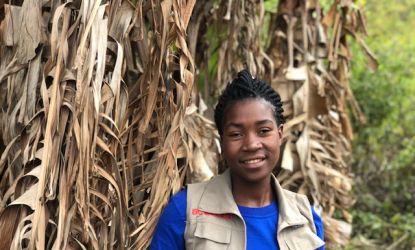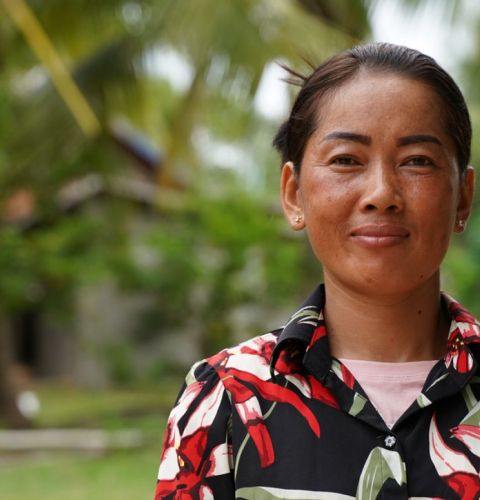How to make your donation go further
What are flexible funds?
Flexible funds are donations which are not restricted to a specific project or purpose. They are given to ActionAid to use wherever the need is greatest.
Not only is this the most efficient way to donate, but flexible funds are also the backbone of our funding model, allowing us to allocate funds in the way that will achieve the greatest impact. These invaluable funds enable us to work towards our vision of a just, equitable and sustainable world in which every person enjoys the right to a life of dignity and freedom from poverty and oppression.
Flexible funds allow us to innovate, enhance the quality of our programming and respond where the need is greatest. They also make it possible for us to invest in essential infrastructure, such as Finance and IT, which means we can operate more effectively.
Since ActionAid was founded in 1972, we have built relationships with thousands of supporters in the UK and globally. They have made all our work possible by donating to emergency responses and supporting our work around the world. Over a quarter of ActionAid’s global income is raised in the UK. Last year, just over 65% of our UK income was channelled to the international federation to support our humanitarian and development work overseas.
By donating to ActionAid’s Flexible fund, our supporters can help us to operate strategically and sustainably, directing funds to ActionAid’s highest priorities in the UK and around the world.
In 2023
3.6m
people have been supported through our humanitarian work.
£1.4m
was raised to support people affected by the Turkey-Syria earthquake.
30m
people reached through our campaigns and advocacy.
Why does ActionAid need flexible funds?
In 2022, over half of ActionAid’s UK income was designated to a specific project.
Funds which go directly to our programmes are very valuable, but do not always capture the full scope of our work as a global federation.
Managing these funds can be time-consuming and costly, and charities can become dependent on circular funding cycles to keep projects running when they are funded in this way. Donors may also choose to allocate funds to the highest-profile issues or most well-known countries, leaving other areas under-resourced.
Flexible funds allow us to address the issues which are most urgent for the communities we work with as part of our long-term relationships with them.
Flexible funds also allow us to respond to changing circumstances, which is incredibly valuable in our humanitarian work because we don’t know when or where the next emergency will strike. We want women to choose where support is most needed in a disaster, because they know their communities better than anyone.
For example, in Zimbabwe we trained women to lead their communities’ recovery from Cyclone Idai in 2019. One of these leaders, Hilda said “I will train women not to wait for food handouts. They can plant crops on the land that was not destroyed.”
How flexible funds are spent: the UK picture
Most of ActionAid UK’s funds go towards supporting the global Federation’s humanitarian and development work overseas, and even the funds raised by ActionAid UK, spent in the UK, are used to support the global Federation achieve its mission and to make exciting progress towards our goals.
- Mobilise resources: We raise money to fight poverty and injustice and ensure women and girls can access their rights. In 2022, the £59.6 million we raised included £11.2 million to fund child sponsorship programmes across 29 countries. We also signed up 12,200 new regular supporters and managed large-scale partnerships with a wide range of corporates, philanthropists and foundations, including People’s Postcode Lottery, who donated £3 million in 2022.
- Influence for change. We work alongside women and girls living in poverty to challenge violence and exploitation and fight for women’s equal rights to economic opportunities. This includes delivering high impact campaigns. In June 2023, ActionAid hosted a roundtable as part of our advocacy and influencing work, attended by over 20 global decision makers and donors. The project also inspired Girl-Led Action which used findings to create change including improving access to counselling and Sexual Reproductive Health Rights services in Bangladesh, and tackling gender-based violence in Ethiopia.
- Support humanitarian action. When emergencies strike, we respond alongside affected communities, focusing on the specific threats and needs faced by women and girls, who are often disproportionately affected. We prioritise women-led responses because when women are equipped to take the lead, whole communities benefit. In the UK, we support this work by providing programmatic expertise and raising funds. We are a member of the Disasters Emergency Committee (DEC), and in 2022 we worked with other DEC members on an Afghanistan appeal which raised just under £1.1m for our response in Afghanistan. In 2022, the ActionAid UK Humanitarian team secured UK-held contracts worth £15.5m in total (£3.5m in 2021) and provided significant support to other members of the ActionAid Federation for contracts worth £22.5m (£8.6m in 2021).
How flexible funds are spent: the Global picture
The majority of our flexible funds are sent directly to our programmes around the world or to ActionAid’s Global Secretariat - an international team who provide support to ActionAid teams across the globe to enhance the quality and outcomes of their work. In line with our feminist leadership principles, we create a space for people to take the lead in addressing the issues they face and to tell us where funds should be spent to achieve the greatest impact. Our team in the UK are accountable for ensuring donations go to the right place and are spent in the right way, enabled by strong financial controls and governance procedures which are overseen by our experienced trustee board. We reached millions of women through our work reached every year by our work across diverse programme areas – women’s rights, economic empowerment, land and climate and emergencies. For example:
- In 2023, we have responded to 28 humanitarian emergencies, in 26 countries. This has included catastrophic disasters which have gone to emergency appeal: the East Africa food crisis, the war in Ukraine, the Turkey-Syria earthquake, the Morocco earthquake and the crisis in Gaza.
- Under our climate priority we set up sustainable agriculture initiatives including in countries like Brazil and Ethiopia. Women are working together to grow and sell food, sharing the profits equally to help send their children to school.
We are continuing to prevent violence against women and girls, fight for climate justice and support women to become economically empowered.
Flexible funds have given a lifeline to women and girls in these unprecedented times, allowing us to work with them to design high-impact responses which are relevant to their context.
How could your flexible donation make a difference?
Building a life that’s about more than just survival takes time and ActionAid addresses the root causes of poverty, not just the results. We support communities for as long as it takes to ensure real change not only happens, but that it will last.
For example, we continue supporting communities to build their resilience to future crises long after a disaster strikes. By making an invaluable donation to ActionAid’s Flexible Fund, you can help women and girls lead change in their communities today and in the months and years ahead.

Surviving climate change – Hilda’s story
Meet Hilda who lives in eastern Zimbabwe. She is a climate change survivor. Her home and community was left in tatters by Cyclone Idai in March 2019. Climate change is a major contributory factor to extreme weather events, which are growing in both frequency and intensity.
ActionAid Zimbabwe and its partners ran an early recovery programme for Cyclone Idai survivors as the organisation moved its response from immediate needs to mid-term.
A key part of the response has been to train female leaders at a community level, so that they can pass on the protection and leadership skills to help their communities recover from the effects of the cyclone. Hilda is one of those leaders and she will lead in training the women to be self-reliant in the face of the adversity.
“I will train women not to wait for food handouts,” she said. “They can plant crops on the land that was not destroyed by Cyclone Idai. Now that roads have been cleared the women can engage in various income generating activities"
Women like Hilda, who display resilience and determination, are key for communities to be able to mitigate the worst effects of climate change.
Find out more
If you’re interested in making a donation to our Flexible fund, you can speak to your ActionAid contact, or use the team contacts below, for more information and ways to donate.
Trust and New Markets: UK.Foundations@actionaid.org
Corporate Partnerships: uk.corporatepartnerships@actionaid.org
Philanthropists: UK.Philanthropy@actionaid.org
General Enquiries: UK.PhilanthropyPartnerships@actionaid.org
We would like to thank all our supporters who donate to ActionAid’s Flexible fund, enabling us to make strategic investments and use their funds where they are needed most. Donations to ActionAid’s Flexible Fund are indispensable because they enable us to be an agile, responsive and forward-thinking organisation.
If this doesn’t feel quite right for you at the moment – take a look at our Emergency action fund. This is still a strategic way of giving but provides a level of restriction to emergency response work. Vital for ‘silent’ emergencies that don’t receive the media coverage attention they need to raise funds.
Page updated 15 January 2025
